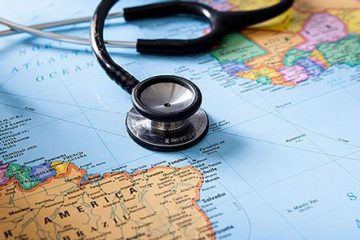“Climate change is the greatest public health challenge of the 21st century”- The Lancet
Climate change already has an impact on the health of populations everywhere and according to all predictions, this impact will only increase and put a strain on already fragile health systems serving the most poor and vulnerable. As Global Health students, let’s brainstorm together and try to minimise such an impact.
Air pollution causes over 7 million deaths each year and so far, is the most felt consequence on human health of our impact on Earth. Predictions show several more very likely scenarios affecting global health like more intense heat waves and fires causing more injuries or deaths. Predicted changes in precipitation patterns might accompany accelerated microbial and parasitical growth with shifts in their geographic and seasonal distributions and we will probably witness the re-emergence of formerly prevalent diseases with the increase in their vectors. For example, changes in malaria, the influenza virus, cholera or shistosomiasis patterns will need efficient and coordinated public health efforts.
Even when studying the most optimistic scenarios, by 2030 climate change will probably be responsible for 250 000 deaths, the result of malnutrition, malaria and diarrhoea, among other disease and conditions.
When addressing these studies, more diffuse risks must also be taken into account. Tensions and local conflicts arising from scarce natural resources, especially fresh water, displacement of groups followed by impoverishment and violence, unemployment in farming communities and mental health issues are all possible scenarios.
All of the consequences mentioned above will disproportionately affect low and middle income countries and in those, the more vulnerable groups such as children, women (who make up for 70% of the 1.3 billion people living in extreme poverty) and the elderly. Climate change will put a tremendous strain on health systems and on social structures, increasing social disparities.
Health policies in each country will have to make health systems more resilient. They need to be able to respond to harsher conditions, acting on social determinants that affect climate-sensitive diseases. Simultaneously, there needs to be a coordinated response by countries to address air pollution and climate change and attempt to reverse, to a certain degree, the situation. Regulations within the energy sector, including putting the right price on carbon will help fight the unfair advantage carbon has against cleaner energies. This can be translated into health, economic and social gains.
So, the real question is: what, as a global health student with an almost silent voice in the global setting, can I do?
– Start talking about it! Whether you are at University or in your work place, when journal clubs or department meetings are held, bring up the topic. We need to start addressing this now, as a health community and as a global community. Look around your study/workplace and think of one way you can make it greener, even if only by changing the type of lightbulbs used, using recycled paper and recycling bins;
– Calculate your Carbon Footprint and get creative while trying to minimise it;
– Check World Health Organization website and read what the public in general and health professionals can do:
http://www.who.int/globalchange/publications/key_messages/general_public/en/
http://www.who.int/globalchange/publications/key_messages/health_professionals/en/;
– Check the UN’s website and “take action” section on Climate Change. http://www.un.org/climatechange/take-action/;
– If you need further help or information contact WHO’s Department of Public Health and Environment( carbonfootprint@who.int);
– Get inspired and share your ideas with us ( @GlobalHealthNGN) to lend our collective voices or to inspire others!
This article was based on “Climate and Health country profiles- 2015- A Global overview” by the World Health Organization and United Nations.


0 Comments